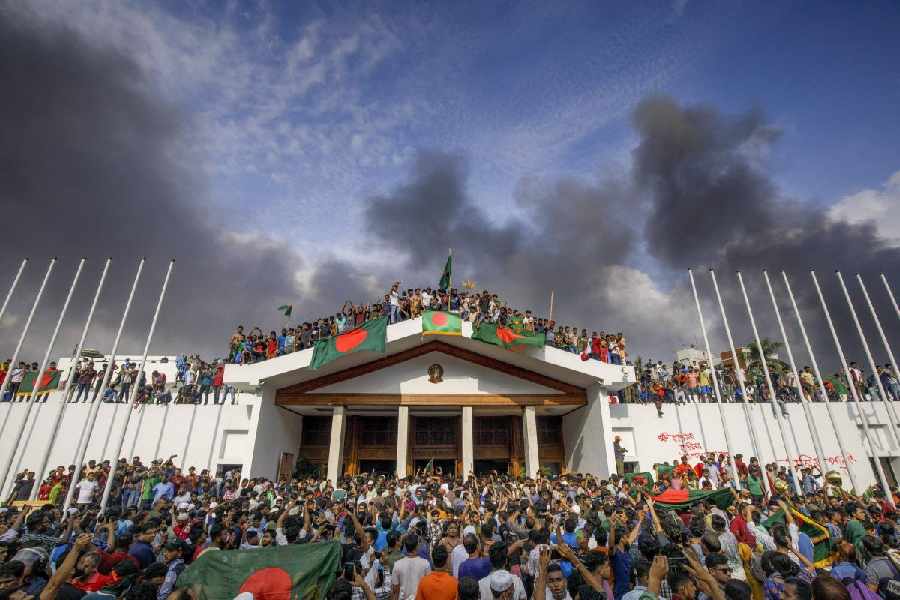Nearly 650 people have been killed in the recent unrest in Bangladesh between July 16 and August 11, the UN Human Rights Office has said in a preliminary report, suggesting a thorough, impartial and transparent investigation into reports of extrajudicial killings, arbitrary arrests and detentions.
According to the 10-page report titled “Preliminary Analysis of Recent Protests and Unrest in Bangladesh”, nearly 400 deaths were reported between July 16 and August 4 while around 250 people were reportedly killed following the new wave of protests between August 5 and 6, leading to the ouster of former prime minister Sheikh Hasina.
The available public reports by media and the protest movement itself claimed that between July 16 and August 11, more than 600 people were killed due to the wave of violence following the Anti-Discriminatory Student demonstrations.
The number of reported killings in revenge attacks since that time remains to be determined, the report, released on Friday in Geneva, said.
Several deaths were reported between August 7 and 11, including those who died while undergoing medical treatment for injuries sustained in the violence, the UNHCR report suggested.
Those killed include protesters, bystanders, journalists and several security forces personnel, it said, adding that thousands of protesters and bystanders were injured, with hospitals overwhelmed by the influx of patients.
The report said the reported death toll was likely an underestimate as information collection faced a hindrance by restrictions on movement due to the curfew and the internet shutdown.
Furthermore, hospitals were reportedly prevented by state authorities from providing details of those killed and injured, the report suggested.
Triggered by the reinstatement of a quota system for the allocation of jobs in civil services, the student protests in Bangladesh in mid-June turned violent, with reports of severe human rights violations by security forces.
“There are strong indications, warranting further independent investigation, that the security forces used unnecessary and disproportionate force in their response to the situation," the report said.
"Additional, alleged violations, that also warrant thorough, impartial and transparent investigations included extrajudicial killings, arbitrary arrests and detention, enforced disappearances, torture and ill-treatment, as well as severe restrictions on the exercise of freedoms of expression and peaceful assembly,” the report said.
There were also reports of looting, arson and attacks on members of religious minorities, as well as reprisals against and revenge killings of members of the former ruling party and police following the resignation of Hasina on August 5, the report said.
On August 15, mobs armed with bamboo sticks, iron rods and pipes reportedly assaulted the former prime minister's Awami League Party supporters who had gathered to pay their tributes to Bangabandhu Sheikh Mujibur Rahman on his death anniversary.
The UN report emphasised the importance of rapidly restoring law and order, as well as the need for effective measures to prevent further loss of life, violence and acts of reprisals.
“Law enforcement agencies need to receive clear instructions and training on the use of force, in line with international human rights standards. They must protect populations at risk against any retaliatory or revenge violence, including minority communities,” the report said.
On Friday, UN Human Rights chief Volker Turk underlined the need for accountability for all those responsible for human rights violations and violence, including against religious minorities, in Bangladesh as his office issued the preliminary report.
Calling for a comprehensive, impartial and transparent investigation into all human rights violations, Turk also said the transition in the South Asian nation is a historic opportunity to ensure governance is anchored in human rights, inclusivity and the rule of law.
Turk’s comments came a day after it was announced that a team from his office is slated to visit Bangladesh next week to investigate the killings of the protesters ahead of and in the aftermath of Hasina’s resignation as the prime minister on August 5.
“The transition ahead presents a historic opportunity to reform and revitalise the country’s institutions, to restore fundamental freedoms and civic space, and to give all in Bangladesh a part in building the future,” the High Commissioner said.
Bangladesh descended into chaos after Hasina fled to India on August 5. Before that, the anti-government protests had killed more than 500 people since mid-July.
Nobel Laureate Muhammad Yunus was sworn in on August 8 as the Chief Adviser of the interim government after he was chosen by President Mohammed Shahabuddin following the dissolution of the Parliament, a decision prompted by a demand by the Anti-Discrimination Student Movement.
The Bangladesh National Hindu Grand Alliance said the minority community faced attacks and threats in 278 locations across 48 districts since the fall of the Sheikh Hasina-led government, terming it as an "assault on the Hindu religion".
Several Hindu temples, homes and businesses of the minority community in Bangladesh were destroyed this month amidst the unrest.
“The High Commissioner (Turk) also welcomed the initiative by various student organisations, faith leaders and other people forming groups to protect minorities and religious sites belonging to minority communities,” the statement said and acknowledged that the interim government has also strongly condemned these acts.
Turk welcomed the release of thousands of detainees and longer-term political prisoners - including some victims of enforced disappearance - and urged the release of all those arbitrarily detained.
The report has detailed the situation with background and gives specific recommendations to all the political actors, the interim government and the international community “to address the present situation in the country that has resulted from the demonstrations and events detailed in the report.” However, long-term comprehensive legal and institutional reforms will be needed, it said.
The high commissioner also announced that a team would visit Dhaka next week to explore areas in which the UN Human Rights Office can support the transition.
Except for the headline, this story has not been edited by The Telegraph Online staff and has been published from a syndicated feed.










